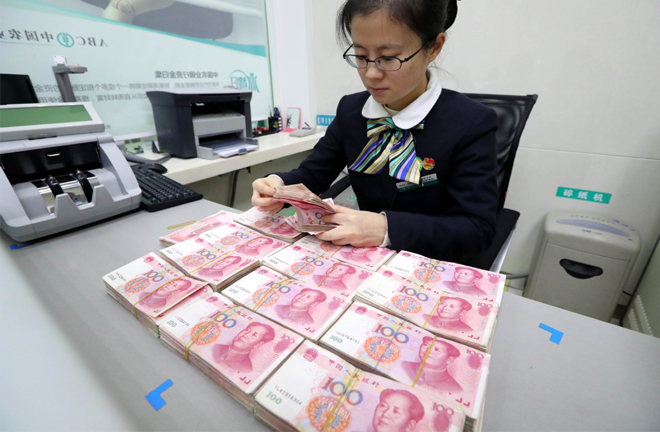Online seminar sheds light on monetization of fiscal deficit

A cashier counting renminbi notes Photo: CHINA NEWS SERVICE
The School of Public Finance and Tax at the Central University of Finance and Economics (CUFE) recently held a webinar to discuss the monetization of the fiscal deficit.
Ma Haitao, vice president of CUFE, regarded the monetization of the fiscal deficit as a comprehensive research topic supporting the modernization of China’s system and capacity for governance. At present, conducting an academic discussion on its theories and policies is quite necessary and realist.
Li Junsheng, chief of the academic committee at CUFE, said that after the financial crisis in 2008, many countries have been less capable of adjusting currencies, but their fiscal policies have been more and more influential. For example, local fiscal policies have led to the raising up of the local governmental debt ceiling, showing that the ability of fiscal channels to create currency has become stronger. Modern monetary theory comes from this background. The theory says that the financial department can directly affect monetary production.
Our country faces the “double pressure” of an economic downturn in China and the world, the “double crisis” of health and economy, and the “double threats” of global politics and reverse globalization, said Guo Qingwang, a professor of the School of Finance at Renmin University of China. As such, at present and for a period of time in the future, we need to learn from the intelligence of economic theories at home and abroad and establish a series of theoretical frameworks and supporting policies with Chinese characteristics.
Feng Qiaobin, vice minister of the Department of Macroeconomic Research at the Development Research Center of the State Council, said that after 2008, all countries have had to develop debt-driven economies. Though the trend of China’s economy has not changed, it still faces downturn pressure. Different from the previous arrangement, the monetary department should be in charge of adjusting the fiscal structure together with the financial department and innovate policy instruments. The financial department can also use policy instruments to fully mobilize market funds.
Li Yongyou, vice president of Zhejiang University of Finance and Economics, explained that the society has paid close attention to the monetization of fiscal deficit due to how traditional methods cannot resolve current economic problems. Putting a large amount of money into the market could tackle these problems. How to put money into the market is associated with the coordination of finance and monetary policies. When facing a severe epidemic, fiscal and monetary policies should coordinate with each other and increase efficiency while keeping a long-term vision, avoiding ineffective policies.
Yu Pitao, president of Anhui Branch of China Development Bank, said that the nature of discussion on the monetarization of the fiscal deficit is to research how to coordinate fiscal and financial policies in the process of deficit financing. Treasury bonds could support market entities through stocks and debts and leveraging more financial capital. Meanwhile, the country should ensure moderate risks in the financial system and that market entities use leverage properly so as to assist market entities to recover and to control systematic risks to the maximum extent.
According to Zhang Bin, vice president of the University of the Chinese Academy of Social Sciences, climbing debts in all countries, more and more burdensome loan pressure, and problems with the monetary transmission mechanism that emerged after the global financial crisis have revealed something about the monetization of fiscal deficits to a certain degree. Deficit monetization is an attempt to replace current political instruments and solve current problems, but our attention should be paid tothe deep structural problems faced by China and other countries and the promotion of structural reform.
edited by WENG RONG
